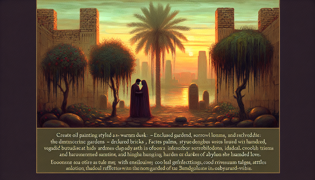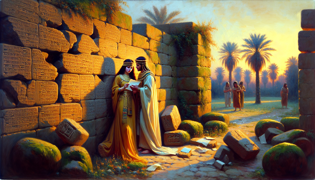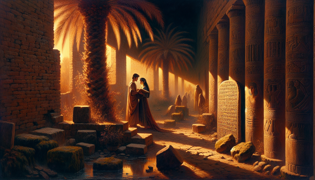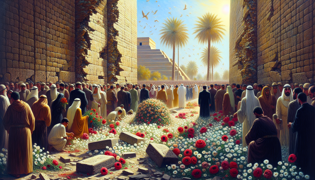Pyramus and Thisbe of Babylon: A Tragic Love Beyond Walls
Reading Time: 10 min

About Story: Pyramus and Thisbe of Babylon: A Tragic Love Beyond Walls is a Myth from iraq set in the Ancient. This Dramatic tale explores themes of Romance and is suitable for Adults. It offers Cultural insights. Two lovers in ancient Babylon, kept apart by a garden wall, face a fateful misunderstanding that seals their doom.
Introduction
Under a saffron sky, Babylon crouched like a lioness at rest. Its burnt-orange walls glimmered along the horizon as if sealing in every whispered secret. Within an opulent quarter lay two adjacent homes, their private gardens divided by an ancient brick barrier. This wall, red as desert sandstone, stood between Pyramus and Thisbe, star-crossed youths who longed to traverse the narrow crack that let their voices meet.
Pyramus, with eyes dark as polished basalt, spent days tracing each crevice in the mortar, eager for one more glimpse of his beloved’s silhouette. The scent of date blossoms clung to the air, sweet and heady, mingling with the distant clang of metalworkers forging bronze idols beside the Euphrates. Meanwhile, Thisbe wore her hair braided in the fashion of Ishtar’s priestesses, her laughter a ripple upon still water. They promised themselves that no wall—even one as ancient as Nimrod’s ramparts—could quell a bond born of fire.
Methinks their passion was as ephemeral as desert dawn, yet fiercer than a storm-swept dune. Each dusk they called through the narrow breach, voices softer than silk but resonant as temple drums. ‘Yalla,’ whispered Thisbe one evening, ‘let our hearts run free.’ The local gardeners would remark that their fervour rivalled the blossoms’ riot of colour.
The city around them pulsed with life: a tapestry of merchants hawking cinnamon, the clatter of chariots over cobblestone broadcasting a world of bustle. Amid that clamour, the two found quietude, their hopes entwined like tendrils of honeysuckle climbing the red wall. They dared to dream of flight beyond Babylon’s gates, where love might transcend stone. Yet fate, ever capricious, prepared its cruel jest, for no barrier-built bliss can endure without peril’s shadow.
I. The Wall Between Two Hearts
The morning sun gilded the battlements of Babylon as Pyramus lingered by the crimson wall. He whispered over the gap in its stones, his voice trembling like the reeds by the Euphrates. On the other side, Thisbe pressed her palm against the same brick, feeling its roughness as though it were the last trace of skin between them.
Babylon awoke in a swirl of fine dust and the scent of frankincense carried from distant temples. Pipers in the marketplace tested their instruments, producing a faint drone that seeped through windows. Pyramus, clad in a tunic of pale linen, retrieved a slender reed pen and pressed it through the crack, inscribing his heart’s words upon a scrap of papyrus. The texture felt like cold fishskin, slick with ink. Thisbe fetched it gently, her breath stirring the parchment like a breeze over rippling water.
Between stolen promises she would murmur, “Methinks the stars conspire to unite us,” while he replied, “As sure as the lion guards its cubs, our love shall endure.” Each vow remained hidden from prying eyes, for their families forbade the match—noble houses jealously guarding lineage and wealth. Yet youth’s fervour seldom heeds caution. They vowed to meet beneath the withered date palm by the southern gate, once darkness claimed the streets.
The warmth of the wall seeped into their palms, reminding them that stone endures far longer than flesh. Overhead, a hoopoe bird called, its melancholy trill disappearing in the roar of a distant merchant’s baritone. Thisbe would later recall the faint tang of roasted chickpeas that wove into the smoky air at sunset, an invisible tapestry entwined with their stolen moments.
Full of resolve, they sealed their secret pact with an ancient idiom: “Yalla, let no blade of destiny sever our union.” Little did they know that destiny had sharpened its own edge, lying poised beneath the very earth of Babylon’s splendid courts.

II. Whispers Through the Brick
Night draped her velvet shawl across the city as Thisbe crept through silent corridors. The stone beneath her sandals felt cool, like the scales of a serpent. She carried a lamp glowing amber, its flame flickering against vast pillars carved with Ishtar’s ascent. Her heartbeat echoed like a drum within her chest; every footstep nudged the edge of terror and hope.
Pyramus awaited by their appointed palm tree, its fronds whispering secrets in the pale light. The date leaves smelled of honey and dust, recalling warm afternoons. He held a small satchel of figs wrapped in linen, token of sweetness amidst sorrow. When Their eyes met, it was as though two planets aligned, illuminating the gloom.
They leaned close, voices hushed as if the stone walls themselves might betray them. Thisbe brushed her fingers across Pyramus’s cheek, remarking on the stubble there, rough akin to birch bark. He sighed, tasting the resinous scent of her oil-perfumed hair, redolent of desert winds. Between them lay the barrier’s shadow, yet their souls danced together, untroubled by mortar.
Soft music drifted from a nearby courtyard—lutes and tambourines tuning before a festival. It sounded distant, ghostlike, beneath the hush of palms. Thisbe’s lamp cast lanternlike reflections on her lover’s brow. She pressed a kiss onto his fingers, murmuring, “Inshallah, soon we’ll slip past this stone prison to freedom.” Pyramus dared a smile, though his throat felt parched as driftwood.
They formed a plan: at the first crow of a rogue cock, they would flee the city by hidden paths known only to river fishermen. He traced maps in the dust with a trembling finger, uniting red lines that marked safe havens. The warmth of his palm left a glow upon the earth. She pressed her cheek to his palm, tasting salt and longing.
In that moment, the city’s distant hum grew louder—horses stamping, guards chatting. The world beyond beckoned, bright as a polished gem. Yet fate moved unseen, sowing seeds of mischance that no fervent heart could uproot.

III. A Crimson Mistake
The eastern sky blushed with dawn when Thisbe arrived at the rendezvous, her heart pounding harder than gallery drums. But horror greeted her: Pyramus lay prone beneath the date palm, blood staining his tunic as though a scarlet waterfall had broken loose from his breast. Nearby, paw prints marred the sand—huge, irregular, like a giant beast that had wandered into their clandestine grove.
She let out a wounded cry that echoed against the crumbling wall, sounding akin to a dull bronze gong smitten unjustly. A fierce lioness had roamed from the hunting grounds, her mane flecked with dust and dried ichor. Pyramus, stumbling to confront her, had been mauled despite his valour. The beast departed, leaving only grief and a mangled heap of hopes in her path.
Thisbe sank beside him, the coarse earth biting into her palms like dozens of tiny needles. The breeze carried the faint clink of morning bells from the ziggurat, a cruel chorus to her anguish. Frantic tears blurred the world, leaving only two forms entwined beneath the strangest altar. She trembled, smelling the iron tang of his blood mingled with wild musk. The air felt thick as treacle, each breath labouring under sorrow’s weight.
She pressed her hand over his wound and prayed in desperation—‘Beloved, hold fast! The dawn shall carry me to queens and kings to save thee!’ But his hand fell limp. His final glance bore love’s last testament. Thisbe’s scream trailed off into the wind, an echo caught between heaven and earth.
In a fit of despair, she drew the dagger beneath her sash—its blade cool as fresh stream water—and kissed its tip before pressing it to her heart. Time slowed; the ground spun beneath her feet like a whirling potter’s wheel. With one trembling breath she slid the steel home, crimson blossoming across her robes. The world slipped into silent darkness, leaving only two lifeless bodies clasped beneath the wall they could never scale.
Birds overhead took wing, wingbeats muffled by the hush that follows tragedy. In that hush, Babylon’s very stones seemed to weep.

IV. Eternal Embrace in Dust
News of the double suicide raced like wildfire through Babylon’s winding streets. Traders let fall their wares; priests abandoned their altars. Beneath the sun’s midday glare, the garden gate swung open to a gathering throng of mourners. The earth underfoot, warm and grainy as sugar, bore footprints circling around the lovers’ still forms.
King Nebuchadnezzar himself arrived, his cloak billowing like a storm-tossed sail. He ordered the barrier wall undone, brick by brick, as though in that act he might erase the cruel boundary that caused such ruin. Each stone tumbled with a hollow clang, echoing the emptiness now lodged in every witness’s heart. The air tasted dusty, as if every grain held a story of grief.
Upon the wall’s ruins, the people planted white poppies and crimson roses—symbols of innocence and blood intermingled. They wove garlands of myrrh and placed them atop the newly lowered stones. Local children pressed their small palms against the collapsed mortar, feeling its gentle warmth and vowing to remember. A soft chant arose, voices melding in a lament that flowed like a river of tears.
By afternoon, the city’s sorrow had given birth to legend. Poets inscribed elegies on clay tablets; musicians composed dirges on urn-shaped lyres. Even the Tigris slowed its course, its current murmuring in hushed tones as though paying homage. Merchants spoke of the lovers as though they had become constellations, their shapes traced among the stars by restless astronomers. They named the narrow crack in the fallen wall the “Lovers’ Gap,” a testament to passion that heedless fate could not contain.
Though Pyramus and Thisbe lay cold, their spirits lingered in every rustle of date palms, every scent of frankincense, every echo of temple drum. Babylon had tasted the sweetness of genuine devotion and the acrid sting of loss. Their story wandered from lips to lips, transforming into a timeless warning that love, however fervent, must also heed the shadows it invites. Yet most recognised that no boundary—brick, decree or sorrow—could extinguish the flame they lit across mortal realms.

Conclusion
Babylon never forgot the names of those who loved beyond the bounds of stone. Pyramus and Thisbe became more than mortals; they became a lesson etched in clay and heart alike. In markets and courts, in temples and taverns, their tale was told: a story of two souls unyielding, of a wall that mortal hands might demolish but whose memory endures.
Fishermen along the Tigris would pause as oars plunged into water, raising tales of star-crossed lovers as flickering lamplight danced upon ripples. Merchants, haggling over spices, found their voices soften when the subject turned to devotion’s price. Parents teaching children of honour and hazard invoked Thisbe’s unwavering courage; youths rehearsed Pyramus’s final vow as if it were a sacred liturgy.
In time, poets across many lands borrowed their names, adapting the tragedy to desert towns and Mediterranean isles. But Babylon laid claim to the original lament. There, every crack in stone, every call of the hoopoe, every red petal drifting across the dust spoke of two hearts that refused to yield.
Their sacrifice transformed a mere wall into an enduring monument. And though they rest beneath silent earth, their passion remains an ember that cannot be quenched. As long as love itself survives in any soul, Pyramus and Thisbe will whisper through the ages, urging all who listen to honour both the flame and the shadow it casts.
















